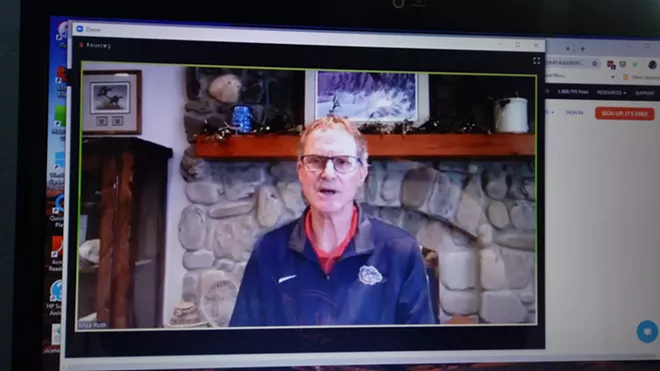
Dan Nailen photo
Gonzaga Athletic Director Mike Roth, coming through one reporter's laptop screen Wednesday morning.
Like so many things regarding the coronavirus, there are a lot of hopes for a rapid return to normalcy — all of them couched in the reality that none of us really know how the pandemic is going to affect our lives three months from now, or six months down the line.
While many questions Roth addressed concerned things like recruiting and the well-being of Gonzaga's student athletes, the most noteworthy takeaways regarded whether sports on college campuses will return to normal for the 2020-21 school year, and what fans can expect.
"Right now, no one knows what this is going to look like going forward," says Roth, completing his 23rd year at the helm of Gonzaga athletics. "We're all hoping the restrictions will start to ease ... at some point. We don't know what fan participation will look like."
Roth recounted an interview with golfer Andy North, who was asked about playing tournaments without fans and responded, "Why would we play without fans? What's the point of that?"
Roth has the same attitude about the men's and women's basketball teams at Gonzaga, and popular sports in general.
"In our case, we get to play in sold-out buildings," Roth noted. "I don't foresee that happening, playing without fans."
"If it's not safe for our fans to come to games," he added, "how would it be safe for our student athletes?"
That said, he did remind participants that, upon the virus's spread, the NCAA's first inclination for March Madness last month was to play in empty arenas. The Zags men's team got word of that idea while on the plane home from winning the West Coast Conference tournament in Las Vegas. Within 24 hours, the entire NCAA tournament had been canceled — a tourney in which Gonzaga's men were expected to earn a No. 1 seed in the West Region and play in Spokane Arena, while the Gonzaga women probably had earned the chance to host two rounds of the women's tournament at McCarthy Athletic Center on campus.
Asked about the potential for games with limited numbers of fans keeping their distance from each other if need be, Roth dismissed that idea as probably a non-starter.
"I can't imagine that we're going to be allowed to have fans at games and still have 6-foot gaps between fans," he says, noting that when the Kennel is back to life, "it'll be with no restrictions." And it won't be until it's safe for people to gather anywhere, from churches to movie theaters, not just for sports. "We're not going to put people at risk."
Whether normalcy returns this summer, in November, or in the fall of 2021, we won't know for a while. Roth noted that Gonzaga recently announced its plan to open for fall 2020 semester as scheduled, and some fall sports like volleyball and soccer typically have their players arrive on campus in late July and early August. Washington state's restrictions on group gatherings would have to be lifted by then for those students to come back to campus on a regular time frame.
As the nation slowly reopens, even non-football schools like Gonzaga will be watching the Power Five conferences in how they deal with football season as guidance. If college football season isn't able to fire up by Sept. 1, Roth says, it's hard to imagine any other sports going forward on their regular schedule.
The cancellation of college football for a season would be an economic disaster for those schools, Roth noted, but Gonzaga and its peers in the WCC have their own challenges. The NCAA basketball tournament generates billions of dollars each year, and each conference and school gets a piece of that revenue. Because there was no March Madness this year, Gonzaga is getting 30 percent of its usual take of NCAA money. "That's the reality."
"This whole thing is costing Gonzaga a lot of money ... but it pales in comparison to what the Power Five conferences are facing if they can't play football," Roth says.
Even so, Gonzaga remains in decent shape to weather that hiccup with its athletic programs. Teams are still meeting (albeit online) and recruiting of future Zags athletes continues (also online). Like every other school or business, Gonzaga is in wait-and-see mode regarding the coronavirus.
Roth noted that he's disappointed for the athletes who had their seasons cut short, or didn't even get to really start their spring seasons before the school shut down. But they can still "win in the classroom" and "win in the community" by doing what it takes "to help defeat this virus."
